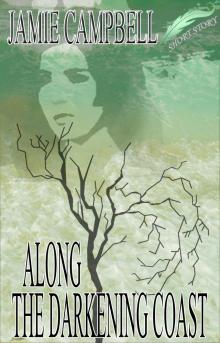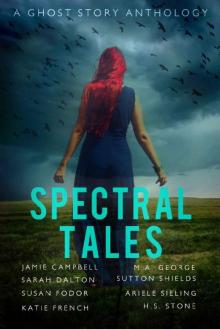- Home
- Jamie Campbell
Spectral Tales: A Ghost Story Anthology Page 13
Spectral Tales: A Ghost Story Anthology Read online
Page 13
She glared at him, and all of the fight suddenly drained from her body.
Mac was speechless.
"I've definitely seen enough," the commanding officer said. "Soldiers, please take everyone to the hold. We will question them individually and go from there. Take White Rabbit and Imamu to the infirmary and have the doctors make sure they are healthy. Go!"
***
The next several hours consisted of rounds of doctors, rounds of questions, and rounds of interview rooms. Her sister Ann came to see her while she was in the infirmary.
“I can’t believe what happened to you!” Ann exclaimed, reaching out to grab White Rabbit’s hand. “You must have been terrified! But how brave!”
Then Logger knocked on the door.
Ann smiled and invited him in. She fluttered her eyelashes and blushed when he said hello to her. Then he turned to White Rabbit.
"Hey, honey," he said. "I heard you were sick and was worried ‘bout ya. I told the doctors I'll be taking you home when you get out of here."
"No!" White Rabbit heard herself say. "No, no, no! I'm not going anywhere with you! I hate you! You can go to hell!"
Logger suddenly stepped forward, his massive body looming over the bed. “What did you just say to me?”
“I said, ‘no!’” White Rabbit repeated. “You can’t come home with me and I don’t want anything to do with you.”
She gulped as an angry fire blazed in his eyes. He grabbed her by the arm and squeezed so hard she saw stars.
“You don’t speak to me that way,” he exclaimed, his voice a low, guttural growl. He leaned down so that his face was only inches from hers. “I will take you home, and you will let me help you, or else. I sent you to the bilge and I can do worse than that! Now, you will say yes.”
“No,” she said.
He roared like an animal and punched the wall right next to her head. White Rabbit bent over, arms protecting her head, in fetal position.
Ann began to scream, loudly. A soldier passing by in the hall heard her shrieks.
"What's happening, ma'am?" he asked, bursting through the door.
"He's trying to kidnap me," White Rabbit said, scowling at the large plumber standing in front of her, her hands once again shaking from the sudden show of violence. “And he punched a hole in the wall when he got mad.”
"Excuse me, sir," the guard said. "Please, come with me."
He went grudgingly. She didn't see Logger again after that, and she discovered the next day that Mac had been fired.
When the questions and the doctors and the talking finally stopped, hours later and long after Ann had gone home, she gathered up her tools and headed back towards their apartment. It was late and the corridors had dimmed to emergency lighting only.
"Hey!" a voice behind her called. "It's me!"
She turned. Imamu was jogging down the hall towards her.
"You didn't wait!" he exclaimed.
"I didn't know where you were," she replied. "I thought they put you somewhere safe."
"They just made sure I'm healthy, after having my atoms bopping around in a teleport for half a millennium," he replied. "They have a place for me to stay though, so I'll probably head there soon. Where are you off to?"
"Going home," she replied. "I've had a long day, and I didn't even manage to cut the ghost wires."
He smiled. "Can I walk you home?"
"You don't even know where you're going!" she protested.
"You do," he answered.
She shrugged, a little smile crossing her lips. "If you want to."
"I do. Want to know why?"
"Why?"
"Because you saved me. And I think you are incredible." He reached out and took her hand.
She looked down. She wasn't even shaking. Not one little bit.
About Ariele Sieling
Ariele Sieling writes science fiction novels and short stories, and works to blend the potential for human capacity and future technology with a little bit of humor. She is the author of The Wounded World, The Clock Winked, and The Lonely Whelk, in addition to two children's books. She lives in New Hampshire with her three cats.
Website
Twitter
Facebook
Newsletter
Slave Runner
H.S. Stone
It wasn’t the scream that woke Malika. The sudden shift in momentum when the carriage stopped jolted her awake. Her sister’s body slammed into hers, and both girls untangled their limbs as they fought to reach a sitting position.
“What happened?” Kappai asked, wiping the sleep from her eyes.
Malika’s eyes swept through the inside of the wagon. Gray streaks of light found their way though the cracks between the boards that made up their moving prison. Dawn had just broken, although the sun wasn’t high enough in the sky to illuminate their surroundings.
In the opposite corner of the wagon, an older woman, defined only by her outline in the dim light, turned once and went back to sleep. She was already in the wagon when the slave traders captured Malika and her younger sister. At first, the siblings sought out their fellow prisoner, asking her questions about who their captors were, where they were going, and what awaited them at their destination. The woman responded with few words and more often with silence. Malika guessed that she either didn’t know the answers or wasn’t interested in sharing what she knew. For the remainder of the day and night, the siblings kept to their side of the wagon, speaking only with each other.
Malika peered out of a slit half the width of her finger. They were on a dirt road. Sparse grass grew next to the edge of the path, and thin trees that had lost their leaves with the arrival of autumn lay beyond the patches of green.
A loud voice barked orders outside. She recognized the voice as belonging to the leader of the slave traders. Midway through his tirade, another scream tore through the early morning calm.
Kappai huddled close to her sister. “What was that?”
Instinctively, Malika wrapped an arm around the little girl. “I don’t know, but stay next to me.” Staying together was how they had survived thus far.
Ever since their parents died the previous winter in a plague that swept through their village, Malika had looked after her younger sister. Although she was only fifteen years old, Malika was still five years older than Kappai. With only rudimentary knowledge of how to hunt and harvest, Malika managed to keep both of them alive for nearly a year. Sometimes she begged for food, sometimes she worked for it, and sometimes, not proudly, she stole what they needed. But Malika also quickly learned that eating wasn’t the only requirement for survival. Staying out of trouble and diverting attention from themselves was just as important, especially for two girls on their own.
Malika did her best to protect her sister, but her efforts still couldn’t prevent them from ending up in their rolling locked cell.
Through the slit, Malika spotted a slave trader running past the wagon. His leader shouted in his direction, but the harried man ignored the words. He turned his head once, looking back with eyes wide open and mouth agape in fear, but Malika didn’t think it was the leader he ran from.
Was their wagon under attack? As hopeful as she was that someone had rescued them from the slave traders, Malika was also wary that their saviors would become the girls’ new captors. A wagon with three women inside wasn’t worth as much as a bag of gold, but each of them, even the woman in the corner, would fetch a fair price in the slave market.
Malika waited for the next sounds, but nothing reached her ears. Had their attackers left after vanquishing the slave traders? It seemed odd that not one of them remained behind to inspect the carriage.
Making up her mind, Malika let go of her sister and shifted her body so that her legs pointed in the direction of the wagon’s door. She asked Kappai to do the same. “We have to get out of here before anyone returns.”
From their seated position, the girls kicked at the wooden door together. It shook but held firm.
They took a deep breath and kicked once more. This time, the entire carriage shuddered, but the door didn’t crack.
“What are you two doing?” The older woman propped herself up on one arm. “You’re going to get us in trouble if you keep doing that.”
“The slave traders are gone,” Malika explained. “Someone drove them away, and we should leave before they come back.”
The woman’s interest suddenly piqued. She stood up and joined the siblings in front of the door.
“Once more, all together this time,” Malika said.
In unison, the three women struck the door with their feet. A satisfying crack signaled that the door had splintered from its hinges. They gave one more kick, and the door fell open.
The woman jumped out first, followed by Malika and Kappai. Before she gave the sisters a chance to thank her for her help, the woman ran toward the front of the wagon.
“No!” Malika shouted, but it was too late.
As if she had suddenly fallen asleep, the woman’s feet stumbled, and she fell. A scream emanated from her mouth, but it died in her throat before it reached full volume. The woman didn’t try to cushion the blow of her body as it struck the ground. Her arms hung loosely by her side as she collapsed in midstride. She was dead before her face hit the dirt.
Three other bodies lay in front of the wagon. The two screams they had heard earlier, both slave traders. The third corpse belonged to their leader. The horses the dead men rode on were gone, but the horses that pulled the wagon remained tied in place. Their lifeless bodies lay in the road, as inert as the dead men and woman.
Kappai shivered as she held her sister. “What happened to them? And to the woman who was with us?”
Malika saw what caused their deaths hovering in front of the carriage. She also knew why Kappai was unaware of what had happened. Malika possessed the rare ability to see the floating apparitions. “We shouldn’t go that way. There are ghosts.”
***
The sisters stepped between the trees as quietly as they could. The bed of dead brown leaves that littered the ground made it impossible to walk in silence, but they did their best.
Having fled in the opposite direction, the ghosts weren’t whom they tried to hide their presence from. The otherworldly creatures also barely acknowledged the existence of the people and objects in Malika’s world. Although Malika was one of the few who could see ghosts, she knew as little about them as everyone else. Their occasional intrusion into her world was a fact, but no one knew where or when they would appear. Why or how they crossed over was also a mystery, but one that fewer people cared about. From Malika’s past experiences, the ghosts appeared oblivious to their surroundings. They merely existed, and the fact that they killed anyone or anything they came into contact with was, in her opinion, tragic but unintentional.
Malika was more concerned with the slave traders or other strangers they might encounter. Two slave traders had fled when the ghosts appeared, and the sisters had seen no signs of either man since. Because of the ghosts’ location on the road, Malika chose a route that took them in the same direction in which the two men had run. There was no telling if they stayed on the road or if, like Malika and Kappai, they had also wandered into the woods.
A larger problem facing the sisters was the lack of food and water. Hours had passed since they escaped from the wagon, and their last bite to eat took place the night before, when the slave traders gave the three prisoners a loaf of stale bread and a canteen of water to share between them.
With the arrival of autumn, the trees had already lost their fruits. Bare limbs adorned with a few browning leaves stretched from the tree trunks. Malika scavenged the ground for something to eat but found nothing safe. Occasionally, they spotted small animals scampering along the branches, but neither girl had weapons with which to kill their prey, and there was no fire with which to cook a meal.
As they walked, water became a more pressing concern. The hours of walking dehydrated them to the point of exhaustion. The sisters rested frequently, but their thirst only grew.
By the late afternoon, they no longer cared about stealth. They trudged through the woods, feet heavy and sore, throats and lips parched, with their only motivation laying in the knowledge that they had to find some food and water in order to survive. Malika considered letting Kappai rest while she continued onward in search of sustenance for the both of them, but she feared leaving her little sister alone.
As the sun began its descent from the sky, the woods came to an end. Through the last line of trees, Malika saw a humble village not far away. Buildings of stone and wood dotted the horizon.
She urged her sister onward. Kappai, unaccustomed to the strenuous exercise that they had endured, begged for more rest instead. Malika gave her a few minutes. “Let’s try to reach the village before the sun sets. If the villagers are kind, they’ll feed and shelter us, and you won’t have to worry about being tired or hungry anymore.”
She didn’t voice the alternative. If the residents of the village were unkind, hunger was the least of their concerns.
***
Before they reached the village, Malika saw that something was wrong. There were no signs of activity as they approached. She expected someone in the village to see the two girls draw near and sound an alarm or come out to meet them. At the very least, she expected to see people walking about the village or busying themselves with work.
Instead, the buildings stood quietly. No fires burned inside any of the homes despite the coming evening. There were no signs of life at all.
Kappai was the first to spot the corpse. A woman lay on the ground near the first house at the outskirts of the village. An empty bucket rested out of reach of her fingertips. Malika saw two more dead bodies outside one of the other buildings. A man and a boy had fallen while carrying piles of kindling. The branches lay scattered around them, and no one had bothered to pick up the pieces.
“Ghosts?” Kappai asked. Malika nodded. There was no other explanation for the sudden deaths. “Are they still here?”
Malika scanned the area, but she didn’t see any of the deadly, floating spirits nearby. “Not that I can see, but they may be elsewhere in the village. Stay here while I check things out.”
Kappai tried to sound brave, but her voice faltered as she answered, “I will.”
Malika kissed her sister on the forehead. “I’ll be right back. Shout if you see anyone, but don’t go into the village until I tell you it’s clear, all right?”
“Yes,” came the whispered reply.
Malika smiled at Kappai, hoping to pass along encouragement and courage in the gesture. Then she set out for the nearest building, a modest house where the woman with the bucket had come from.
The door to the house was unlocked, and Malika pushed it open easily. A quick inspection showed the house to be empty. She left, looked in Kappai’s direction, and waved to her sister. Kappai smiled and waved back, but she didn’t move from where she stood.
Malika went through the remaining buildings as quickly as she could. Inside most of them, she found the bodies of their inhabitants. They had been in the middle of their usual daily activities when the ghosts swept through the village, killing them before they knew what had happened. Malika felt sorry for the villagers, but their deaths solved a problem for her and her sister. She and Kappai now had a place to stay for the night with plenty of food and water.
Malika returned to Kappai and told her that the ghosts were gone. She also shared her plan for the two of them to spend the night at the village.
The sisters chose the house that belonged to the woman with the bucket. Not only was it the closest one, but it was already empty. They didn’t need to worry about disposing of a dead body inside.
The kitchen housed more food than they had seen in a long time. The two girls gorged themselves until they were well past feeling full. Malika felt guilty about raiding a dead woman’s kitchen, but she also knew that the food would only go to waste if
they didn’t eat it. After the meal, she found cloth bags, which she packed with more food for their journey tomorrow. Between her and Kappai, they could carry enough to sustain them for a week.
Instead of sleeping in the woman’s bed, the sisters chose to sleep on the floor. They had grown accustomed to doing so for the past several weeks, and it was more comfortable than squeezing into the small bed.
“Where are we going tomorrow?” Kappai asked when they had settled under a worn out blanket.
Malika had been thinking for a while about their next course of action. The village where they had grown up was gone, wiped out by invaders. Malika and Kappai were lucky to be away at the time of the attack, hunting for food when the intruders killed their neighbors. The slave traders found them roaming the deserted streets afterwards.
While they were imprisoned in the carriage, Malika overheard snatches of conversations between the slave traders. They talked often of riches and women and topics that she didn’t understand, but she remembered one exchange. A man spoke of someday retiring to a city of riches by the ocean. He had never been to the city, but he had come across merchants who had. The slave trader he was talking to scoffed at the idea, saying that the first man would never retire because he’d most likely die in a tavern fight or by the hands of their leader before earning enough money to fulfill his dreams. Both men laughed at the prediction.
The name of the city stuck in Malika’s mind ever since.
“We’re going to search for Talin. It’s west of here, by the ocean.”

 Along the Darkening Coast
Along the Darkening Coast Cinderella is Evil
Cinderella is Evil Star Struck
Star Struck All the Dead Arising
All the Dead Arising Perfectly Timed
Perfectly Timed All The Pretty Ghosts (The Never Series Book 1)
All The Pretty Ghosts (The Never Series Book 1) A Hairy Tail
A Hairy Tail Secret Songs
Secret Songs Shadow Academy
Shadow Academy Ignite
Ignite The Keeper of Lost Things
The Keeper of Lost Things_preview.jpg) Before The Fall (An Aron Angels Prequel)
Before The Fall (An Aron Angels Prequel) Spectral Tales: A Ghost Story Anthology
Spectral Tales: A Ghost Story Anthology After The End
After The End Magic Bound (Shadow Academy Book 2)
Magic Bound (Shadow Academy Book 2) All the Pretty Ghosts (The Never Alone Series Book 1)
All the Pretty Ghosts (The Never Alone Series Book 1) Songbird
Songbird The Star Kissed Collection
The Star Kissed Collection Fairy Tales Retold
Fairy Tales Retold Trouble
Trouble Three Fates Entwined (The Defectives Book 0)
Three Fates Entwined (The Defectives Book 0) Love Songs (Secret Songbook #1)
Love Songs (Secret Songbook #1)